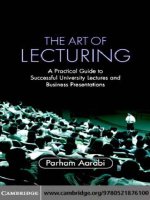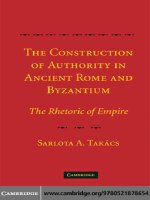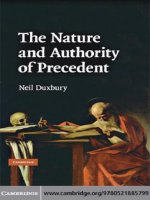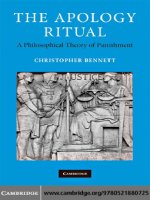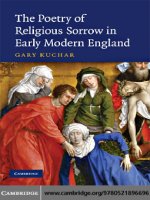cambridge university press the strange survival of liberal england political leaders moral values and the reception of economic debate dec 2007 kho tài liệu bách khoa
Bạn đang xem bản rút gọn của tài liệu. Xem và tải ngay bản đầy đủ của tài liệu tại đây (1.95 MB, 329 trang )
This page intentionally left blank
The Strange Survival of Liberal England
It is often assumed that politicians are swept along by global forces
and influences, without the power – or the desire – to shape events. By
contrast, this book is concerned with the way that cultural values, individual moral sentiments and politicians’ interpretation of economic and
other imperatives have helped to shape political values. Focusing on the
nineteenth and twentieth centuries, and containing contributions by a
series of prominent scholars, themes are developed through essays on
recognisably important events and figures. Subjects include the policy
ideas of W. E. Gladstone, Woodrow Wilson’s support for war in 1916
and Ramsay MacDonald’s role in the 1931 crisis. Other essays examine the way that Keynesian ideas were understood and used across the
party spectrum, and beyond Britain itself, or reflect on the relationship between ideas, values and politics. This volume also celebrates and
represents an approach to historical writing which has received little
attention from scholars.
Prior to his death in 2006, was a fellow of Magdalen
College, Oxford. His publications included The Crisis of Conservatism:
The Politics, Economics and Ideology of the British Conservative Party, 1880–
1914 (Routledge, 1995), Ideologies of Conservatism: Conservative Political
Ideas in the Twentieth Century (Oxford University Press, 2002), Thatcher
(Hodder Arnold, 2006) and Balfour (Haus, 2006).
is Professor of History and Director of the Welsh
Institute for Social and Cultural Affairs at the University of Wales,
Bangor. His previous publications include Political Change and the Labour
Party, 1900–1918 (Cambridge University Press, 1990), Labour’s First
Century (jointly edited with Pat Thane and Nick Tiratsoo, Cambridge
University Press, 2000; paperback edn, 2007), The Labour Party in Wales,
1900–2000 (jointly edited with Chris Williams and Deian Hopkin, University of Wales Press, 2000) and Debating Nationhood and Governance
in Britain, 1885–1939 (jointly edited with Chris Williams, W. P. Griffith
and Andrew Edwards, Manchester University Press, 2006).
The Strange Survival of
Liberal England
Political Leaders, Moral Values and the
Reception of Economic Debate
edited by
E. H. H. Green
D. M. Tanner
CAMBRIDGE UNIVERSITY PRESS
Cambridge, New York, Melbourne, Madrid, Cape Town, Singapore, São Paulo
Cambridge University Press
The Edinburgh Building, Cambridge CB2 8RU, UK
Published in the United States of America by Cambridge University Press, New York
www.cambridge.org
Information on this title: www.cambridge.org/9780521881678
© Cambridge University Press, 2007
This publication is in copyright. Subject to statutory exception and to the provision of
relevant collective licensing agreements, no reproduction of any part may take place
without the written permission of Cambridge University Press.
First published in print format 2007
ISBN-13 978-0-511-37742-6
eBook (EBL)
ISBN-13
hardback
978-0-521-88167-8
Cambridge University Press has no responsibility for the persistence or accuracy of urls
for external or third-party internet websites referred to in this publication, and does not
guarantee that any content on such websites is, or will remain, accurate or appropriate.
For Peter Clarke
Contents
Acknowledgements
List of abbreviations
List of contributors
Introduction
Part I
page ix
x
xi
1
Economic ideas and political leaders
1 Utilitarian or Neo-Foxite Whig? Robert Lowe as
Chancellor of the Exchequer
37
2 Political economy, the labour movement and the
minimum wage, 1880–1914
62
3 Economic interpretations of war: American liberals and
US entry into World War I
.
89
4 Political leadership, intellectual debate and economic
policy during the second Labour government,
1929–1931
113
Part II The use and abuse of economic ideas: Keynes
and his interpreters
5 The Labour party and Keynes
153
6 The Conservative party and Keynes
186
vii
viii
Contents
7 Keynesian ideas and the recasting of Italian democracy,
1945–1953
Part III
212
Economic forces and their significance
8 Where did it all go wrong? Cultural critics and
‘modernity’ in inter-war Britain
247
9 Moral choice and economics: British political economy
in the twentieth century
275
Index
307
Acknowledgements
The editors’ and contributors’ greatest debt across many years has been
to Peter Clarke. This volume is a recognition not only of his contribution
to scholarship and to the profession but of the inspiration, friendship and
tolerance which he has shown to colleagues and students throughout his
career.
The construction of this book has a long and complex history. In compiling it, the editors generated more than the usual quota of debts to
people who had volunteered, been imposed on, obliged to wait – and
who bore this with good humour and patience. The editors would particularly like to thank the contributors, Richard Fisher of Cambridge
University Press and Stephanie Dolben and Linda Jones at the University of Wales, Bangor for their help in bringing the volume to completion. Among archivists and librarians too numerous to list, we would
like to thank those at the National Archives and Cambridge University
Library for their assistance in several essays, together with Andrew Riley
at Churchill College, Cambridge, who has been generous with time and
friendship. Crown Copyright material is reproduced by permission of
the Controller of Her Majesty’s Stationery Office. Stefan Collini, John
Thompson, James Thompson, Barry Supple, Steven Fielding and Jim
Tomlinson made helpful comments on the Introduction. Contributors
lent welcome support with the production of the book.
Ewen Green died as this volume was going to the publishers. The composition of the volume was entirely his idea. He gave as much energy as
he possessed to its completion, to the extent of dictating a fresh paragraph for the Introduction during the week before he died. A number of
academic colleagues were of material assistance in helping Ewen, including some of his former students. Ewen wanted to thank them for their
invaluable help. From our conversations, I believe he would have wanted
to recognise a number of others, for the practical help they gave, for raising his spirits, and for many positive memories: his family, care team, his
many Oxford friends, and his many other friends, both in the UK and
overseas.
ix
Abbreviations
BLPES
CPT
EHR
EcHR
FRUS
HC Debs
HJ
JMK
JRM
LHR
LPA
PS
PWW
TCBH
TNA
TRHS
x
British Library of Political and Economic Science
Trevelyan
English Historical Review
Economic History Review
Foreign Relations of the United States
House of Commons Debates, various series
Historical Journal
The collected writings of John Maynard Keynes, edited by
D. Moggridge (London: Macmillan, various volumes and
publication dates)
James Ramsay MacDonald
Labour History Review
Labour Party archives, Labour Museum and Archives,
Manchester
Philip Snowden
The papers of Woodrow Wilson, edited by Arthur S. Link
et al. (Princeton, NJ: Princeton University Press, various
volumes and publication dates)
Twentieth Century British History
The National Archives
Transactions of the Royal Historical Society
Contributors
Eugenio Biagini is Fellow and Lecturer at Robinson College, Cambridge. His books include Liberty, Retrenchment and Reform: Popular
Liberalism in the Age of Gladstone, 1860–1880 (Cambridge: Cambridge
University Press, 1992) and Gladstone (Basingstoke: Palgrave Macmillan, 2000). He also edited The Risorgimento and the Unification of Italy
(2002) with Derek Beales.
Stefan Collini is Professor of Intellectual History and English Literature
in the Faculty of English at Cambridge University, and a Fellow of Clare
Hall. His books include Public Moralists: Political Thought and Intellectual Life in Britain 1850–1930 (Oxford: Oxford University Press, 1991;
reissued 2006); Matthew Arnold: A Critical Portrait (Oxford: Oxford
University Press, 1994); English Pasts: Essays in History and Culture
(Oxford: Oxford University Press, 1999; reissued 2006); Absent Minds:
Intellectuals in Britain (Oxford: Oxford University Press, 2006).
Ewen Green sadly died in 2006. He was taught by Peter Clarke at University College London, and supervised by him at Cambridge. He held
research fellowships at the Institute of Historical Research, London
and Brasenose College, Oxford, and lectureships at Magdalen College and St Hugh’s College, Oxford and the University of Reading. He
subsequently became Reader in Modern British History, University
of Oxford and Fellow of Magdalen College. Publications include The
Crisis of Conservatism: The Politics, Economics and Ideology of the British
Conservative Party, 1880–1914 (London: Routledge, 1995); Ideologies
of Conservatism: Conservative Political Ideas in the Twentieth Century
(Oxford: Oxford University Press, 2002); Thatcher (London: Hodder
Arnold, 2006).
Boyd Hilton was at Oxford before moving in 1974 to Trinity College,
Cambridge, where he is currently Reader in Modern British History.
His books include The Age of Atonement: The Influence of Evangelicalism on Social and Economic Thought 1795–1865 (Oxford: Clarendon
xi
xii
List of contributors
Press, 1991) and A Mad, Bad, and Dangerous People? England 1783–
1846 (Oxford: Clarendon Press, 2006) in the New Oxford History of
England series.
Barry Supple was formerly Professor of Economic History at the University of Cambridge, Master of St Catharine’s College and Director of the Leverhulme Trust. He has held a series of committee posts
in all the major arts and social science funding agencies. His publications in twentieth-century economic and business history include
Royal Exchange Assurance: A History of British Insurance (Cambridge:
Cambridge University Press, 1970); The History of the British Coalmining Industry, vol. IV: 1913–1946 (Oxford: Clarendon Press, 1987);
plus innumerable essays, including work on British economic decline,
entrepreneurship and welfare.
Duncan Tanner is Professor of History at the University of Wales,
Bangor, and Director of its Welsh Institute for Social and Cultural
Affairs. His PhD thesis – from University College London – was supervised by Peter Clarke. Publications include Political Change and the
Labour Party, 1900–1918 (Cambridge: Cambridge University Press,
1990) and Labour’s First Century (Cambridge: Cambridge University
Press, 2000), edited with Pat Thane and Nick Tiratsoo. He is currently writing a book on Labour intellectuals and policy 1900–1939,
and concluding an ESRC-funded research project on Wales, Britain
and devolution.
James Thompson is Lecturer in Modern British History at the University of Bristol. His University of Cambridge PhD thesis was supervised
by Peter Clarke. He has written on class, trade unions and liberalism,
and published on the relationship between British, European and US
perceptions of political economy in the Edwardian period. He is currently completing a study of conceptions of ‘public opinion’ in British
political culture between the 1860s and 1914.
John A. Thompson is Reader Emeritus in American History, University
of Cambridge, and Emeritus Fellow of St Catharine’s College, Cambridge. His research interests are progressivism and twentieth-century
United States foreign policy. Publications include Reformers and War:
American Progressive Publicists and the First World War (Cambridge:
Cambridge University Press, 1987), Woodrow Wilson (London: Longman, 2002) and a number of articles in British and US scholarly journals. His current project is a book-length analysis of the dynamics of
twentieth-century US foreign policy.
List of contributors
xiii
Richard Toye is Senior Lecturer in History, Exeter University and
worked on Clarke’s biography of Cripps. Publications include The
Labour Party and the Planned Economy, 1931–1951 (London: Royal Historical Society, 2003). He also writes on international history, notably
the rise and fall of the Bretton Woods system, and has published on the
Attlee and Wilson governments. He has also published a larger study,
The UN and Global Political Economy: Trade, Finance and Development
(Bloomington: Indiana University Press, 2004), with John Toye. His
most recent book is Making Reputations: Power, Persuasion and the Individual in Modern British Politics (London: I. B. Tauris, 2005), edited
with Julia Gottleib.
Introduction
Ewen Green and Duncan Tanner
The title of this collection – the strange survival of Liberal England –
is an allusion to the title of George Dangerfield’s classic polemical text,
The Strange Death of Liberal England, a study which set the tone for much
subsequent and more academic analysis.1 Dangerfield had argued that
British Liberalism was effectively finished as a political creed by 1914.
It had proved incapable of addressing the ‘modern’ problems which
Britain faced: industrial unrest, nationalist discord, an upsurge of feminist
activism – and ultimately, the irrationalism of war. Much subsequent
scholarship accepted that ‘moderate’ and ‘bourgeois’ ideologies could
not cope with such challenges. From this perspective, the ideas which
attracted attention were naturally Marxism and fascism, the ideologies
of left and right, in a century dominated by the extremes.2 Britain sat
on the edge of these developments, the dull (but safe and rather pleasant) cousin of passionate and ideologically charged continental movements. Although British Liberalism had survived longer than its continental European equivalent, Britain’s version of these developments was
the polarisation of politics around a two-party, Labour–Conservative,
paradigm: or so historians argued in the 1960s and 1970s.
There were powerful echoes of this emphasis within political science. Much attention was paid to sophisticated (often continental
European) thinkers; the less abstractly theoretical modern British intellectual tradition was often marginalised. This tendency was reinforced
by students of political systems, who saw modern Britain as essentially
different from continental Europe – wrapped up within its evolving
Westminster model, its tradition of democratic progression and crossclass collaboration meant it was less ideological, more pragmatic – more
1
2
G. Dangerfield, The strange death of Liberal England (1st edn, 1935; Stanford: Stanford
University Press, 1997).
For example, E. Hobsbawm, Age of extremes: The short twentieth century 1914–1991
(London: Michael Joseph, 1994).
1
2
Ewen Green and Duncan Tanner
‘British’.3 Even those who stressed the significance of Britain’s moderate social democracy, and of the British breed of politician/theorist,
still felt obliged to compare such writers critically and unfavourably with
their European counterparts.4 Historians of British Conservatism (and
the British Conservative party) fuelled the impression that there was less
engagement in Britain between ideas and politics. The Conservative party
was proudly unideological, rejecting all (even Conservative) ideologies.5
The Conservatives’ main rival, others contended, was a sedate Labour
party, enmeshed in a ‘Labourism’ which was devoid of any real socialist
content.6 Liberalism was hardly worth consideration.
Amongst economists and economic historians, more attention was
always paid to economic thinkers – like Keynes – who had an impact
on economic practice in advanced democracies. However, if this suggests
a difference of political emphasis between students of economic and political ideas, there was nonetheless a similarity of approach. In the same way
that students of political theory were interested in ‘great men’ (men were
indeed the subject of most such studies) Keynes was (likewise) a great
and abstract thinker, whose ideas merited attention for their contribution to the canon of economic thought. In early biographies, Keynes’s
ideas were given an exalted status. This veneration was also apparent in
some historical works. The Labour party in the 1920s, for example, was
denounced as a failure for not adopting Keynesian ideas.7 The appropriateness (and existence) of the great man’s ‘solutions’ for the problem of
unemployment was taken as read.
This book is a product, firstly, of the interest in Liberal, social democratic and socialist political ideas which developed in opposition to these
3
4
5
6
7
The classic statements include T. Nairn, ‘The English working class’, New Left Review
24 (1964), 43–57; L. Kolakowski, Main currents of Marxism (Oxford: Clarendon Press,
1978).
See, for example, D. Marquand, Ramsay MacDonald (London: Cape, 1977), pp. 91–3.
S. Ball and A. Seldon (eds.), Conservative century: The Conservative party since 1900
(Oxford: Oxford University Press, 1994); J. Ramsden, The age of Balfour and Baldwin
1902–40 (London: Longman, 1978), pp. ix–xi.
For example, J. Saville, ‘The ideology of Labourism’, in R. Benewick et al. (eds.), Knowledge and belief in politics (London: Allen and Unwin, 1973). For a summary of this
approach and its applications, J. Callaghan, S. Fielding and S. Ludlam (eds.), Interpreting Labour: Essays on the Labour party and Labour history (Manchester: Manchester
University Press, 2003).
This classic denunciation can be found in R. Skidelsky, Politicians and the Slump: The
Labour government of 1929–1931 (London: Macmillan, 1967). Early biographies included
R. Lekachman, The age of Keynes: A biographical study (Harmondsworth: Penguin, 1969);
R. H. F. Harrod, The life of John Maynard Keynes (Harmondsworth: Penguin, 1972);
D. E. Moggridge, John Maynard Keynes (Harmondsworth: Penguin, 1976). The definitive
biographical study is now the massive three-volume study by Robert Skidelsky: John
Maynard Keynes: A biography (London: Macmillan, 1983, 1993, 2000).
Introduction
3
trends; and, secondly, of scholarship which addresses the connection
between these ‘moderate’ political and economic ideas and public policy
and debate. This introduction argues that substantial and positive developments occurred from the 1970s onwards, both through empirical revisionism and from conceptual innovations which originated within the history of ideas and the analysis of economic policy and practice. The essays
themselves are testimony to the capacity of intellectual and economic history to generate new ideas from within, to absorb ideas from other and
more theoretical bodies of scholarship, to question some emphases and
omissions within these works – and to add substantially to the quality of
scholarship. Such shifts have attracted comparatively little attention from
those concerned with postmodern theories and their impact, with the
means by which history is produced, rather than the produce of historians. One aim of the volume is thus to challenge this neglect by focusing on
and illustrating the relationship between ideas, human agency and politics
in work by a series of scholars with varied but broadly related interests.
I
In the early 1970s, scholars started to challenge the marginalisation of
research on Britain’s moderate political tradition. A number of AngloAmerican scholars emphasised the vibrancy of Edwardian Britain’s radical Liberal culture.8 Labour’s more intellectually sophisticated social
democratic thinkers were also studied, although – like some of its leading
thinker/politicians – largely as the intellectual progenitors of a ‘distinctively’ British social democratic tradition.9 However, perhaps the most
significant development was an emphasis on the continuing intellectual significance of two Liberal thinkers. Scholars argued that Liberalism
was less bourgeois, less irrelevant, less marginal than Dangerfield (and
others) had assumed. Indeed, by the late 1970s, the New Liberal thinkers
L. T. Hobhouse and J. A. Hobson were being portrayed as progressive –
indeed social democratic – thinkers who had developed Liberalism as
a radical creed.10 Moreover, as thinker/activists whose ideas permeated
8
9
10
See, for example, M. J. Wiener, Between two worlds: The political thought of Graham Wallas
(Oxford: Oxford University Press, 1971); A. J. A. Morris (ed.), Edwardian Radicalism
1900–14 (London: Routledge & Kegan Paul, 1974).
J. Winter, Socialism and the challenge of war: Ideas and politics in Britain, 1912–1918
(London: Routledge & Kegan Paul, 1974); L. P. Carpenter, G. D. H. Cole: An intellectual
biography (Cambridge: Cambridge University Press, 1973); A. W. Wright, G. D. H. Cole
and socialist democracy (Oxford: Clarendon Press, 1979).
P. F. Clarke, Liberals and Social Democrats (Cambridge: Cambridge University Press,
1978); S. Collini, Liberalism and sociology (Cambridge: Cambridge University Press,
1979); M. Freeden, The New Liberalism: An ideology of social reform (Oxford: Clarendon
Press, 1978).
4
Ewen Green and Duncan Tanner
politics and reached a wider audience, they had a substantial and broader
impact.
In Peter Clarke’s work, ideas became popular within an organisation
when they satisfied political needs (especially if they were wrapped in the
cloak of party principle and hence ‘legitimised’ in the process). This was
notably the case with Hobhouse’s most famous book, Liberalism (1911),
and with Hobson’s The Crisis of Liberalism (1909).11 The ‘social purchase’
of an idea – its capacity to articulate and mobilise popular interests –
also determined the extent of its appeal to the electorate. Others –
notably Michael Freeden – also abandoned a narrow focus on ideas, but
approached the subject rather differently. Freeden examined the popularity of an idea by looking at the extent to which it permeated a broader
intellectual culture.12 Some works on economic ideas also escaped from
a simple interest in the quality of a theory, stressing the impact of thinkers
like Keynes rather than the value of his ideas as theory.13
This approach paralleled a changing climate within the history of
ideas, particularly within Cambridge. In 1969 Quentin Skinner had
famously argued that it was important to look at a theorist’s intention
and aims, to appreciate that political and other values influenced their
arguments, either directly or indirectly.14 Neither Clarke nor Collini was
a ‘Skinnerite’; indeed, whilst both made reference to Skinner, neither
was consciously ‘theoretical’ in orientation, although neither ignored
theory. Indeed, Clarke referred more to Marx’s writing on ideology than
Skinner’s (if only to refute some of his main arguments).15 Work by
11
12
13
14
15
For this, see P. F. Clarke, ‘Introduction’ to J. A. Hobson, The Crisis of Liberalism (1st edn
1909; Brighton: Harvester Press, 1974).
See Freeden, The New Liberalism. For a fuller account of Freeden’s step away from
the ‘traditional apostolic succession of the “great thinkers”’, and for his subsequent
conceptual innovations, see his Liberal Languages: Ideological imaginations and twentieth
century progressive thought (Princeton: Princeton University Press, 2005), pp. 8–9.
See, for example, D. Winch, Economics and policy: A historical study (London: Hodder &
Stoughton, 1969); S. Howson and D. Winch, The Economic Advisory Council, 1930–1939
(Cambridge: Cambridge University Press, 1977); J. M. Buchanan and R. E. Wagner,
Democracy in deficit: The political legacy of Lord Keynes (New York: Academic Press,
1977).
Q. Skinner, ‘Meaning and understanding in the history of ideas’, History and Theory
8 (1969). See also Q. Skinner, ‘The principles and practice of opposition: the case
of Bolingbroke vs Walpole’, in N. McKendrick (ed.), Historical perspectives: Studies in
English thought and society in honour of J. H. Plumb (London: Europa, 1974). This has
closer affinities with some of the work discussed here, notably in its discussion of the
context of refutation.
For Clarke’s (hardly prominent) comments on Skinner, see Clarke, Liberals and Social
Democrats, esp. p. 291. Collini recognised but declined to elaborate on this (partial) debt –
but added robustly sensible comments on the problems of trying to appreciate intent
on the basis of a literal understanding of the text. See Collini, Liberalism and sociology,
pp. 7–10.
Introduction
5
J. G. A. Pocock was also part of this context.16 It was particularly influential on a rather different group of largely nineteenth-century historians, who started to examine the ways in which moral and religious
values helped form or refract ‘secular’ economic and political notions.17
Linked to the philosophical Conservatism of Peterhouse, the focus of
this research nonetheless shifted away from Maurice Cowling’s apparent concern with the machinations of high politics to the principles of
high Anglicans. This latter (and rather loose) collection of academics is
often seen as a group apart; but relations between those concerned with
(respectively) radical and Conservative ideas and their political impact
were never as strained as those between social historians and ‘Peterhouse’
scholars. True, some historians of religion identified a hostility to their
subject stemming from the ‘left-liberal sentiment and commitment which
characterised western universities from the 1960s’ – and found a ‘Whig’,
‘Marxist’ or ‘Fabian’ scholar lurking around every academic corner. But
it was not historians of twentieth-century radical ideas who rushed to
register their disquiet with this wide-ranging attack.18 Nonetheless, the
thrust of those writing on the resolutely secular Hobson and Hobhouse
was different from those analysing the impact of religious ideas on economics and politics. Many late-Victorian and Edwardian radicals had felt
that religion was often an excuse for seeing ‘moral regeneration’, not state
intervention, as the means of addressing social needs. Those who studied
their ideas paid little attention to the religious moralism which motivated
some New Liberal sympathisers; for many years there were comparable
gaps in the study of Edwardian socialism.
Naturally, not all Edwardian political history focused on the context
in which Liberal ideas were shaped. Much work on Liberal ideology
from within the history of ideas focused less on the New Liberals’ role
as thinker/activists and more on their role as thinkers who deserved a
place in the canon of political thought.19 Some scholars took this further,
16
17
18
19
The most frequently cited work being J. G. A. Pocock, Politics, language and time: Essays
on political thought and history (London: Methuen, 1972).
As in the works of Boyd Hilton, J. P. Parry, Richard Brent and others. For the influence
of Pocock, see, for example, the summary in J. Lawrence, ‘Political history’, in S. Berger
et al. (eds.), Writing history: Theory and practice (London: Hodder Arnold, 2003). For
a more nuanced account of one area where Pocock’s work was influential, R. Brent,
‘Butterfield’s Tories: “High Politics” and the writing of British political history’, HJ 30
(1987), 943–54.
J. C. D. Clark, English society 1688–1832: Ideology, social structure and political practice
during the ancient regime (Cambridge: Cambridge University Press, 1985), e.g. pp. 1–2,
10–12, 88, 95. Nonetheless, there was something behind the polemic, in that cultural
values embedded in elite circles have often permeated popular historical writing. For
example, see Collini below, pp. 251–74.
In addition to works cited at note 10 above, see M. Freeden, J. A. Hobson: A reader
(London, Boston: Allen and Unwin, 1988); M. Freeden, Reappraising J. A. Hobson:
6
Ewen Green and Duncan Tanner
arguing that the ‘Liberal’ principles which they redefined had an enduring relevance, surviving beyond the party’s Edwardian heyday by permeating social democratic thought. Harold Laski and G. D. H. Cole’s
interest in explaining the limits of state centralism was thus seen as evidence of abiding and ‘Liberal’ philosophical influences, which were being
absorbed into socialist thought.20 Ramsay MacDonald’s ‘Liberal’ social
democracy was said to stem from a philosophical Idealism absorbed from
Liberal traditions.21 Economic historians also found evidence of the survival of Liberalism, as Keynesian ideas were apparently absorbed into
Labour policy analysis both in the 1930s and thereafter.22 Such works
did not really look at what ‘Liberal’ ideas meant to those who used them.
Political historians who were more sceptical about ideas as agents of
change – and there were many of them – maintained a rather different approach to that developed by intellectual historians like Clarke and
Collini (or for that matter, Parry and Boyd Hilton). They argued that it
was not so much ideas as people who determined political actions – hence
it was Liberal people, not Liberal ideas, who were responsible for the
longevity of Liberal policies. The inter-war Labour party became a vehicle for progressive ideals, it was suggested, because Edwardian Liberals
like Norman Angell, H. N. Brailsford and others found a place within
its ranks.23 Historians of the Conservative party were if anything even
more cautious about suggesting that Liberal ideas permeated Conservative politics, not least because they minimised the role of ideas in politics
generally. But several noted the positive role of Liberal defectors within
the Conservative party. In Conservative history (before Thatcher) it was
often the ‘Liberal Tories’ (or the Liberal Unionists or National Liberals)
who were seen as the better party leaders, largely because of their capacity
to address a broader (non-Conservative) audience.24
20
21
22
23
24
Humanism and welfare (London: Unwin Hyman, 1990); J. Allett, New Liberalism:
The political economy of J. A. Hobson (Toronto: University of Toronto Press, 1981);
J. Townshend, J. A. Hobson (Manchester: Manchester University Press, 1991); J. Phelby
(ed.), J. A. Hobson after fifty years (London: Palgrave, 1994); J. Meadowcroft (ed.), Liberalism and other writings: L. T. Hobhouse (Cambridge: Cambridge University Press, 1994).
M. Freeden, Liberalism divided: A study in British political thought 1914–39 (Oxford:
Clarendon Press, 1986).
J. Meadowcroft, Conceptualizing the state: Innovation and dispute in British political thought
1880–1914 (Oxford: Clarendon Press, 1995).
E. Durbin, New Jerusalems: The Labour party and the economics of democratic socialism
(London: Routledge & Kegan Paul, 1985).
D. Blaazer, The Popular Front and the progressive tradition: Socialists, liberals and the quest
for unity, 1884–1939 (Cambridge: Cambridge University Press, 1992).
See, for example, P. Marsh, The discipline of popular government: Lord Salisbury’s domestic
statecraft (Hassocks: Harvester Press, 1978), pp. 119–41. The much-praised Liberal
Tories included Baldwin, R. A. Butler and Harold Macmillan. For an account which
places more emphasis on the diffusion and plasticity of ideas, see M. Bentley, ‘Liberal
Toryism in the twentieth century’, TRHS, 6th series, 4 (1994), 177–202.
Introduction
7
In part because of this spread of ‘Liberal’ influences, what seemed striking to many historians was not the power of the political extremes, nor
competition between competing sets of party ideologies, but the strength
of an economic and social policy consensus which crossed party lines and
dominated much of the twentieth century. Initially, and with some notable
exceptions, this ‘consensus’ was not regarded as an ‘achievement’.25
For many historians of the early Labour party, its party’s main leaders, Ramsay MacDonald and Philip Snowden, were guilty of betrayal –
through their love affair with the New Liberalism before 1914 and their
enthusiasm for classical liberal economics in the 1920s.26 The ‘Establishment’s’ commitment to economic orthodoxy permeated government
circles’ including the Civil Service. The ‘Treasury view’ as it became
known amongst economic historians had more impact on policy than
different party ideologies. If war created a new consensus, based around
Keynesian ideas and the social policies of William Beveridge, another
Edwardian Liberal, it was because these ideas represented and offered
‘practical’ achievements – full employment and the Welfare State – and
not because ‘ideas’ were somehow driving forces in constructing a debate
or creating a political agenda.27
It was in this, rather unquestioning, way that ‘Liberal’ ideas were said
to have permeated the post-war world.28 Similarly economists who did
not look in archives argued that the 1950s was a ‘Keynesian era’, in
which governments (across Europe and further afield) were converted
to a Keynesian perspective. Positive references to Keynes and Beveridge
amongst politicians were often taken at face value. The ‘scientific’ value
of their economic and social doctrines made them unquestionable. In
other instances, however, there was also recognition of popular support
for the fruits of the post-war settlement. It was argued that the terms
of the policy debate were constrained not just by the nature of post-war
economic growth and by the relative strength of the ideas behind ‘consensus’, but by public demand. There was a relatively narrow intellectual
and political space in which politicians could operate compared to other
periods.29 It took a strident Conservatism – and its strident representative, Margaret Thatcher – to finally put ‘Conservative’ Keynesianism to
25
26
27
28
29
B. Harrison, ‘The centrist theme in modern British politics’, in B. Harrison (ed.), Peaceable kingdom: Stability and change in modern Britain (Oxford: Clarendon Press, 1982).
For a more nuanced view, see J. Harris, ‘Labour’s social and political thought’, in D. Tanner et al. (eds.), Labour’s first century (Cambridge: Cambridge University Press, 2000),
esp. pp. 11–19.
P. Addison, The road to 1945: British politics and the Second World War (London: Cape,
1975).
See, for example, D. Kavanagh and P. Morris, Consensus politics from Attlee to Thatcher
(Oxford: Basil Blackwell, 1989).
We owe this point to James Thompson.
8
Ewen Green and Duncan Tanner
rest in the 1970s. Labour’s parallel ‘rediscovery’ of socialism, as articulated in the Alternative Economic Strategy of the early 1980s and the
politics of Tony Benn, meant that Keynesian ideas were finally beaten to
their corner across the political spectrum.30 However, a consensus was
restored when New Labour accepted the principles of ‘Thatcherite’ economic policy, returning British politics to the pragmatic consensus model
which some see as a ‘normal’ feature of the country’s political life.31
The challenge to this idea of a cross-party consensus came from several
sources, perhaps most significantly from the ordinary process of historical
revisionism. New and more evidently archival scholarship – often based
around government papers in the Public Records Office – suggested that
economic experts within the Civil Service were not easily won over to
the ‘Keynesian’ cause. In the 1930s the Keynesian revolution was strictly
skin-deep.32 During the war, the apparent heyday of cross-party agreement, the ‘consensus’ was more apparent than real.33 There was limited
enthusiasm even by the 1950s.34 Revisionism sprang from other sources
as well. The success of Thatcherite Conservatism encouraged people to
question whether the success of ‘the left’ (and of those who advocated
state intervention) was quite as predetermined as people once seemed
to think.35 The growing salience of monetarist economics in the 1980s
encouraged a fresh look at the economic policies of the past. It also produced work which questioned the value of Keynesian economics as a
simple explanation of economic performance, and which started to suggest that perhaps ‘Keynesian economics’ had been less widely accepted
than one might have thought.36
30
31
32
33
34
35
36
For this, see, for example, M. Wickham-Jones, Economic strategy and the Labour party
(Basingstoke: Macmillan, 1996).
R. Heffernan, New Labour and Thatcherism: Political change in Britain (Basingstoke:
Palgrave, 2001), chap. 8.
J. Tomlinson, ‘A “Keynesian revolution” in economic policy making?’, EcHR 37 (1984),
258–65; N. Rollings, ‘British budgetary policy 1945–1954: a “Keynesian revolution”?’,
EcHR 41 (1988), 283–98. See also R. Middleton, ‘Economists and economic growth in
Britain’, in L. Black and H. Pemberton (eds.), Affluent Britain: Britain’s post-war ‘golden
age’ revisited (Aldershot: Ashgate, 2004).
The substantial older literature on this (and on the post-war period) is summarised in,
for example, H. Jones and M. Kandiah (eds.), The myth of consensus: New views on British
history, 1945–64 (London: Palgrave Macmillan, 1996).
A. Booth, ‘Britain in the 1950s: a “Keynesian” managed economy?’, History of Political
Economy 33 (2001), 283–313; N. Rollings, ‘Poor Mr Butskell: a short life wrecked by
schizophrenia’, TCBH 5 (1994), 183–205.
These developments encouraged some scholars (including the editors) to question the
primacy of class in pushing the Labour party to the fore and to recognise that periods of
‘popular’ Conservative success were historically quite common.
Studies include S. Howson, British monetary policy 1945–51 (Oxford: Clarendon Press,
1993). Monetarist ideas were applied more directly and critically to interpretations of
British economic problems between the wars.
Introduction
9
Political historians also helped undermine the idea of a cross-party
economic consensus (or a shared and pragmatic search for the middle
ground). They showed that in the 1950s, discontent with the ‘consensus’ festered beneath the skin of the Conservative party.37 Putting ideas
back into the history of Labour’s economic policy had already created
an awareness of the party’s reoccurring interests and emphases, which
included doubts about the policy assumptions which underpinned the
‘consensus’, especially on the left.38 Other work showed that the political
parties’ policies on taxation,39 economic planning40 and consumerism
differed even when they used a similar language.41 Within the Labour
party, Keynesian ideas were always less attractive than various versions
of state control, often linked (from the 1930s through to the 1960s)
with enthusiasm for some form of economic planning.42 There were
substantial divisions between the political parties on both economic aims
and social ideals, even when the rhetoric of politics suggested a search for
the centre ground. Political and economic history produced arguments
in favour of historical revisionism without recourse to any particularly
‘new’ and heavily theoretical approaches.
Nonetheless, a fresh emphasis on the role of ideas in politics had an
equally potent and conceptually more original influence. The idea of an
Edwardian ‘consensus’ over free trade was challenged by scholars who
37
38
39
40
41
42
E. H. H. Green, Ideologies of Conservatism: Conservative political ideas in the twentieth century (Oxford: Oxford University Press, 2002), pp. 222–7. See also R. Lowe, ‘Resignation
at the Treasury: the Social Services Committee and the failure to reform the Welfare State’, Journal of Social Policy 18 (1989), 505–26, and J. Tomlinson, ‘An unfortunate alliance: Keynesianism and the Conservatives, 1945–1964’, in A. J. Cottrell and
M. S. Lawlor (eds.), New Perspectives on Keynes (Durham, NC: Duke University Press,
1995).
See, for example, N. Thompson, Political economy and the Labour party: The economics of
democratic socialism, 1884–1995 (London: UCL Press, 1996).
R. Whiting, The Labour party and taxation: Party identity and political purpose in twentiethcentury Britain (Cambridge: Cambridge University Press, 2000); M. Daunton, Trusting
Leviathan: The politics of taxation in Britain, 1799–1914 (Cambridge: Cambridge University Press, 2001); M. Daunton, Just taxes: The politics of taxation in Britain, 1914–1979
(Cambridge: Cambridge University Press, 2002).
D. Ritschel, The politics of planning : The debate on economic planning in Britain in the 1930s
(Oxford: Clarendon Press, 1997).
M. Hilton, Consumerism in twentieth-century Britain (Cambridge: Cambridge University
Press, 2003); F. Trentmann (ed.), The making of the consumer: Knowledge, power and
identity in the modern world (Oxford: Berg, 2006); M. Daunton and M. Hilton (eds.),
The politics of consumption: Material culture and citizenship in Europe and America (Oxford:
Berg, 2001).
R. Toye, The Labour party and the planned economy, 1931–1951 (Woodbridge: Royal
Historical Society, Boydell Press, 2003); J. Tomlinson, Democratic socialism and economic
policy: The Attlee years (Cambridge: Cambridge University Press, 1997); J. Tomlinson,
The Labour governments 1964–70, vol. III: Economic policy (Manchester: Manchester
University Press, 2004).
